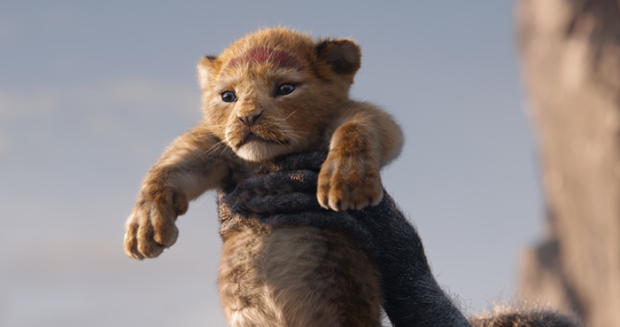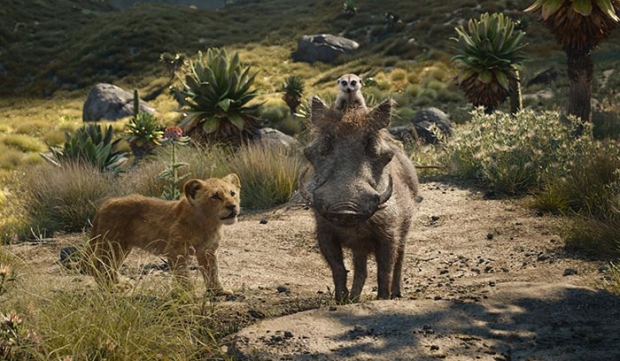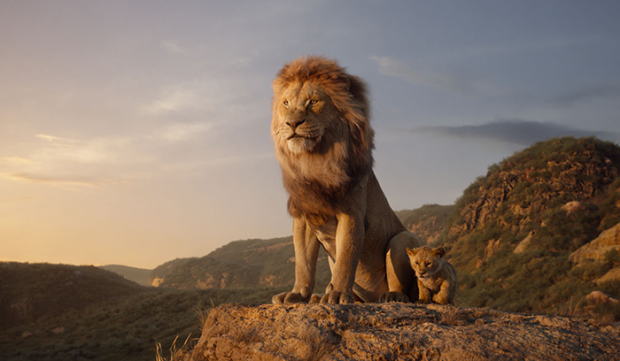Audiences Just Can't Wait for The Lion King Movie — But Is It Worth it?
Donald Glover, Beyoncé, and James Earl Jones are among the voices re-creating Disney’s most profitable classic.

(© Disney Enterprises, Inc.)
Everything old is new again as Disney christens The Lion King as the next resurrected property from its legendary 1990s renaissance. Aladdin and Beauty and the Beast have already been checked off the list, with live-action remakes of Mulan and The Little Mermaid on deck. However, as a property that has both artistic clout (holding the coveted EGOT status) and broad marketability (the Broadway musical alone has earned Disney over $8 billion), this reboot seems to carry higher stakes than the rest of Disney's exercises in nostalgia and advanced technology.
Director Jon Favreau, who oversaw Disney's CGI-centric remake of The Jungle Book in 2016 to much acclaim, brings the same artistry (thanks to the same visual effects team at Moving Picture Company) to The Lion King — the Hamlet-inspired story of Mufasa (a reprise performance by 88-year-old James Earl Jones), his son and heir to the throne Simba (Donald Glover), and Simba's conspiratorial uncle Scar (Chiwetel Ejiofor), who ascends the throne through murder and manipulation. Only the most die-hard Disney purist would deny that this is a visually stunning achievement in filmmaking. And if aesthetic awe is what you're after at the movies, you'll surely get a return on your personal investment (it's relevant to bear in mind that Beyoncé's Nala comes with a Beyoncé'd version of "Can You Feel the Love Tonight"). If, on the other hand, you're someone who's searching for more a profound motivation for Disney's choice of reboots, you're probably not going to find it in this finished product.
This Lion King gives millennials like myself exactly what they know and love (even boasting a shot-for-shot 1994 vs. 2019 trailer on its IMDb page) while freshening up some jokes that either didn't survive the 25-year journey or were dispensable enough to replace — the best executed of which is the new version of Timon and Pumbaa's 11th-hour hyena diversion (no, the cross-dressing hula number didn't make the cut, but we're all going to be okay). Every choice in the film feels like a meticulous negotiation between the competing interests of old versus new, and the end result is beautiful, sturdy, and perfectly inoffensive.

(© Disney Enterprises, Inc.)
That being said, Billy Eichner and Seth Rogen deserve a special moment of recognition for succeeding in the film's most difficult job — replacing Nathan Lane and Ernie Sabella as Timon and Pumbaa. Some of the jokes they're handed are better than others (there are a few lazy self-referencing quips during "Hakuna Matata"), but Eichner's dandyish delivery is a delightful complement to Rogen's signature rumpled innocence (John Oliver is a perfect Zazu, as anticipated, but doesn't get as much material as his predecessor, Rowan Atkinson).
And yet, the performances of those distinguished comedians have to be relatively subdued to match the lifelike animation, which can't carry as much exaggeration as the 1994 cartoon. Facial expressions are dampened and animal choreography is muted — a merciful guard against gratuitous silliness and a contributor to the darker tone the film strikes on the whole (the stampede scene is possibly even harder to watch in this incarnation). The comedy, however, gets numbed in the process of hewing towards realism.
The sharp comedic editing of the original film has been relaxed in the hyper-realistic atmosphere of the savanna, and the craving for it is something even the dulcet tones of James Earl Jones's famous paternal speech can't satiate. One addition to that father-son moment we can all appreciate, however, is Mufasa's deliberate distinction between "ruler" and "owner" as he shows Simba the land he will one day protect with honor — not govern like a dictator. Perhaps the choice to expound on the responsibility that comes with inherited power was made regardless of current events, but I'd prefer to believe that Disney saw an opening and seized an opportunity.

(© Disney Enterprises, Inc.)







